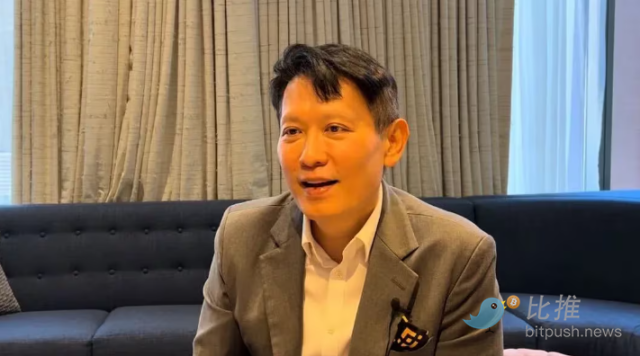Entretien exclusif avec Richard Teng, PDG de Binance : Nous sommes plus décentralisés et n'avons pas besoin d'une introduction en bourse
Original author: Ben Schiller
Original translation: BitpushNews Alvin Liu
Yesterday, CoinDesk had the pleasure of interviewing Binance’s new CEO, Richard Teng. It was a great opportunity to meet the executive entrusted with running the world’s largest cryptocurrency company at such a fascinating time. A former regulator, Teng was appointed last year after Binance reached a $4.3 billion settlement with U.S. authorities for violating sanctions and anti-money laundering regulations. He replaced Binance’s legendary founder, CZ, who is currently serving a four-month prison sentence in California.
My colleague Cheyenne Ligon wrote about the interview yesterday (headline: Binance, unlike other large crypto companies, isn’t considering an IPO right now). Here are some other highlights and some personal impressions.
Teng is different from CZ
CZ always came across as someone in power, the operational and spiritual leader of Binance. Teng is a different kind of CEO. He referred questions about technology and future plans to other managers, and Teng emphasized that Binance is now a more decentralized company. Today, Binance is organized very differently than when CZ was leading it, Teng told us. It used to be a founder-led organization, managed by CZ. Now, its a completely different corporate structure. Its a board-led organization. We have three independent directors and a talented and experienced executive team that runs the day-to-day operations of the company. Teng previously worked as a financial regulator in his native Singapore and the UAE. He was appointed CEO because he understands regulation and regulators. The challenge for Binance is to convince authorities that it can be trusted on money laundering and other sensitive issues. The company has invested heavily in compliance. Teng is the right person for the moment, with his elegant manner and calm demeanor.
CZ once said that Binance is a global company, meaning not only that the company operates globally, but that it truly belongs to the world, not just one country. Since Binance got into regulatory trouble, that statement has changed: Binance is now looking for a headquarters. But Teng said the company has not yet decided where to locate its headquarters.
We have not yet made a decision on the global headquarters issue. This is very important and very complex. We need to understand very carefully the impact of this issue on various stakeholders, he said. Regulatory and tax consequences appear to be the most important issues in these deliberations.
When asked why Binance wants to set up a headquarters now, Teng said: “I think the global headquarters is actually to assure regulators about the shape and direction of the company. It’s similar to a board of directors.”
Running a Global Cryptocurrency Business is… Complicated
US cryptocurrency companies often complain about the uncertainty of doing business in the US due to a lack of legislation and the slowness of regulators at the SEC and CFTC to provide clear guidance on what is and is not allowed when it comes to digital assets. Imagine running a business around the world with such clarity lacking in many jurisdictions. Binance has 19 licenses around the world and has recently been approved in Thailand, India, and Brazil. There are a lot of cultural and legal complexities involved.
Take Nigeria, for example, where Binance’s American employee Tigran Gambaryan is currently detained. Nigeria has claimed without evidence that cryptocurrencies are responsible for the devaluation of its currency, the naira, and local law enforcement has accused Gambaryan of money laundering and tax evasion. According to the BBC, Nigeria is demanding $10 billion in exchange for his release, which, frankly, sounds a lot like a ransom demand.
“Tigran has been detained unjustly for nearly six months,” Teng told us. “He needs treatment or his condition will deteriorate permanently.”
No plans to go public
In the past six months, with the approval of cryptocurrency spot ETFs and the Bitcoin halving event, there have been rumors that several large cryptocurrency companies are seeking to go public in the current cryptocurrency cycle. But Teng said that while giants such as Circle are preparing for listing, Binance is satisfied with its current ownership structure.
“We are in a very strong financial position, so there is really no need for us to consider any funding or IPO at this time. Binance has been profitable since its fifth month of operation (in 2017) and has been very cautious in spending. So (IPO) is not a topic for us to discuss.”
I wont be returning to the U.S. for now.
We wondered if Binance would consider returning to the U.S., where it currently does not have a license. Perhaps Trump’s victory, which many believe will create a more favorable environment for cryptocurrencies, could be a trigger? Teng said there are no plans at the moment. “Our business is outside the U.S. So we are watching what’s happening in the U.S. with excitement, but it has no impact on our business.” Teng said the U.S. remains an “important market,” but given all the issues it’s had with U.S. regulators over the past few years, Binance doesn’t seem to be in a rush to return. But luckily, Teng still wanted to make the trip, so we and others were able to talk to him about Binance and the future of cryptocurrencies.
This article is sourced from the internet: Exclusive interview with Binance CEO Richard Teng: We are more decentralized and do not need an IPO
Related: How will UK encryption policy change if the Labour Party wins the election?
Original author: Mia, ChainCatcher Original translation: Marco, ChainCatcher On July 4, the dust settled on the British general election. The Labour Party won an overwhelming victory in the House of Commons election, winning 412 seats in the House of Commons, and party leader Starmer moved into 10 Downing Street. This was the most one-sided election victory in the history of the Labour Party, ending the Conservative Partys 14-year rule. This historic election result undoubtedly brought major changes to the British political landscape and left many suspense for domestic and foreign observers. Former British Prime Minister Sunak once called for cryptocurrencies to be part of his policies, and when he was elected, he promised that the UK would embrace encryption technology and make the UK a global cryptocurrency center. So will…








